Most people suck at accurately predicting the future. I’m one of them.
I took my shot at the prediction hall-of-fame last year, predicting that Microsoft would spend more than $1 billion on acqusition(s) in the marketing technology space in 2015. I thought it was a reasonably solid bet. And when they tried to buy Salesforce for $55 billion in the spring, I was feeling pretty cocky for about a week — that would have been an A+ prediction — until that deal fell apart.
Microsoft made plenty of interesting acqusitions in 2015, but not a major marketing platform for north of $1 billion. So I earned a solid “F” on my one concrete prediction.
However, I actually did much better with my not-quite-predictions for 2015:
- Marketing technologists did multiply and were fruitful, as was evident at the two electrifying MarTech conferences in San Francisco and London. (A+)
- The marketing technology landscape did indeed grow for 2015. (A+)
- The ISV ecosystems around major platforms did flourish — although not as much as I would have hoped, and frankly, they’re still not very well marketed by most platform providers. (A-)
- The adoption of “marketing middleware” did increase — DMPs, customer data platforms (CDPs), tag management sytems (which have evolved into marketing data pipelines), and cloud connector apps of all kinds — as marketers continued to build their own “stacks.” (A)
- The lines between software vendors and service providers blurred a little — Merkle, Experian, Alliance Data come to mind — but not as much as I would have expected. (C+)
- There weren’t many new big company entrants into the marketing tech space in general, although Facebook, LinkedIn, Twitter, and Google all continued to build deeper direct relationships with marketers. (C-)
- A couple of the martech categories that I predicted would be hot were very hot — sales enablement and post-customer marketing — but a couple were only warm — marketing finance and marketing talent management. Internet of Things (IoT) and interactive contnet were still just sparks. (B-).
Overall, I’d give my not-quite-predictions from last year a B+ or maybe an A-.
So I won’t offer any predictions for 2016, but I’ve probably qualified to share several not-quite-predictions — slightly vague but meaningful ideas and trends that I think are likely to impact marketing in the year ahead.
The first two have already been foreshadowed by my earlier posts, the 5 stages of maturity in marketing technology categories and the race for the #1 and #2 marketing technology brands:
#1. 2016 is the year we hit “peak martech” in the marketing technology vendor landscape. My rough approximation is that there are about 4,000 marketing technology companies worldwide at this point. The next version of my landscape won’t cover all of them, just a large representative sample. While new martech ventures will certainly be launched in the year ahead, the rate of exits, failures, and pivots (EFPs) will result in a plateauing of the total number of active vendors in the space. Most of the new entries will be organic or angel-funded, as I detect most VCs becoming wary of their ability to find “breakout” start-ups in this space. We’ll start to see some real consolidation in the more mature categories of the landscape.
#2. However, 2016 will be a blockbuster “crossing the chasm” year for many of the leading marketing tech vendors. Martech is going mainstream. The top brands in many categories will start to pull away. There will still be lots of greenfield opportunities for the lesser brands, but the distance between them will grow. Marketing tech is becoming an executive-level and board-level topic at non-tech companies. It will be a great year for marketing technologists who can help. For instance, I just saw a post for a VP of Marketing Technology at Subway, the sandwich franchise. (Insert “stack” joke here.)
The next MarTech Conference in San Francisco, March 21-22, will have an overarching theme of the “mainstreaming of marketing tech” — and what that means for marketers, marketing technologists, and the vendors who love them.
Those are the two big marketing tech phenomena I expect to dominate 2016. However, here are five other not-quite-predictions that I think will make for interesting storylines:
#3. Adtech-based display advertising is going to get kicked in the bal… balance sheets. The ad blocker issue will continue to gain momentum. But what I think is really going to hurt is that advertisers are going to have new paid channels to invest in that have greater efficacy. The biggest will be “Search 2.0” — the rise of new search-like channels in virtual assistants, such as Facebook M, will provide exciting demand-driven opportunities for paid presence. With the multiplication of connected devices and the advancement of artificial intelligence applications, these dialogue-based systems for matching buyers and sellers have tremendous room for innovation and growth ahead. The movement to give consumers “advertising” only when it’s relevant and they actually want it will reshape that industry. Huge opportunities here. Native and social advertising will grow too.
#4. Vertical competition for enterprise marketing tech companies is going to get fierce. Following up to #3, companies like Facebook, LinkedIn, and Google — and possibly others such as Apple, Amazon, Verizon, Comcast, Slack — will be the best positioned to connect brands and audiences with highly targeted adtech and martech services. Since they are closer to the consumer than the enterprise martech vendors are, and many of them have monpolistic-like relationships with their users, they will wield enormous leverge. They’ll set the adtech/martech agenda — “madtech” as David Raab brilliantly coined — more than Adobe, Oracle, and Salesforce will, and they will grab a much larger piece of the marketing budget pie.
#5. More marketing technology categories will have open source alternatives. Open source is coming to martech in a big way, and I think we’ll see a number of viable projects launched in 2016. Where will these open source contenders come from? Some will emerge from struggling commercial vendors who fail to win #1 or #2 spots in their category, who will pivot to open sourcing their solutions as a “nuclear option.” Given issues with #4, arguably there will be more opportunity for revenue in enterprise marketing tech services than pure software subscriptions. There is a small but promising possibility that these open source initiatives will herald the beginning of data standards in the martech space. I doubt that will come to fruition in this next year, but the seeds will likely be planted. Services companies (agencies, systems integrators, and other marketing service providers) will become champions of this approach because it’s a different lever of vertical competition in their favor.
#6. Heterogeneous marketing technology stacks will thrive as martech integration becomes easier. The major marketing clouds are foundational players in the martech ecosystem, but the narrative that one-suite-will-rule-them-all has diminished in recent months. The far majority of marketers I talk with are embracing a multi-product stack strategy. These marketing stacks are increasingly “rationalized” — i.e., they are implemented with a clear division of responsibility, de-duped use cases, a workable data interchange strategy, and an overall economy of architecture (as few products needed to achieve success, but no fewer). This is becoming easier with solid platform APIs and ISV ecosystems, plenty of great “middleware” options, a focus on good integration out-of-the-box from specialist martech providers, and more marketing technologist talent at brands to make these interconnections work.
#7. Account-based marketing (ABM) and sales will be one of the hottest categories of 2016 — and help usher in greater sales/marketing alignment. ABM has become the perfect storm of deepening prospect data, personalization, the search for an antidote to adtech inefficiency and content marketing noise, a new generation of martech visualization, and the demand for greater sales and marketing alignment in the digital world. There are some pure-play ABM vendors, many of whom I suspect will have a great year, but I think we’ll see ABM capabilities implemented across a wide range of martech products. The rise of “smart outbound” will accompany this as a counterpoint to inbound marketing — but a harmonious counterpoint.
My bonus not-quite-prediction — and take this with a grain of salt, because I’m biased on this one — is that interactive content will be a hot category in 2016 too. I may be biased, but as a result, I also have first-hand knowledge of this. Marketers are going to be innovating an incredible set of interactive “mechanisms” in their programs and campaigns in the year ahead — partly to break through content marketing noise and partly to acquire a deeper set of data than classic “digital body language.” And there are some really fascinating possibilities for applying interactive content in sales/marketing alignment too.
Those are the top things on my mind for the year ahead. What do you see?
Reminder: if you want to take a thrilling journey to the center of the marketing tech universe at MarTech this March, you can save $500 if you register before January 9. This will be the best deal on MarTech tickets.
Best wishes for a wonderful 2016!

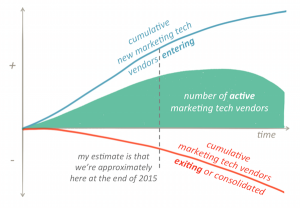
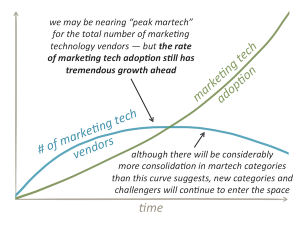
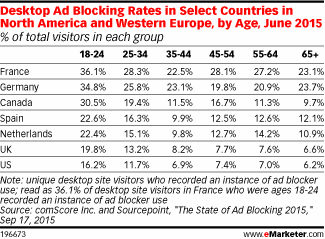
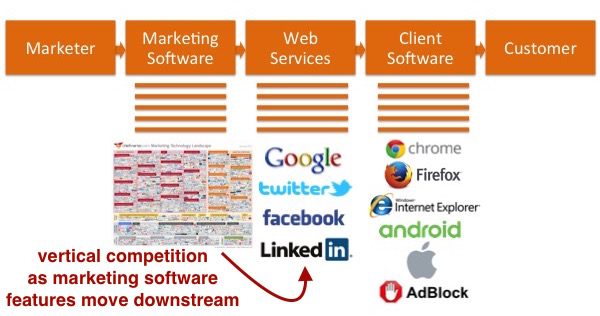
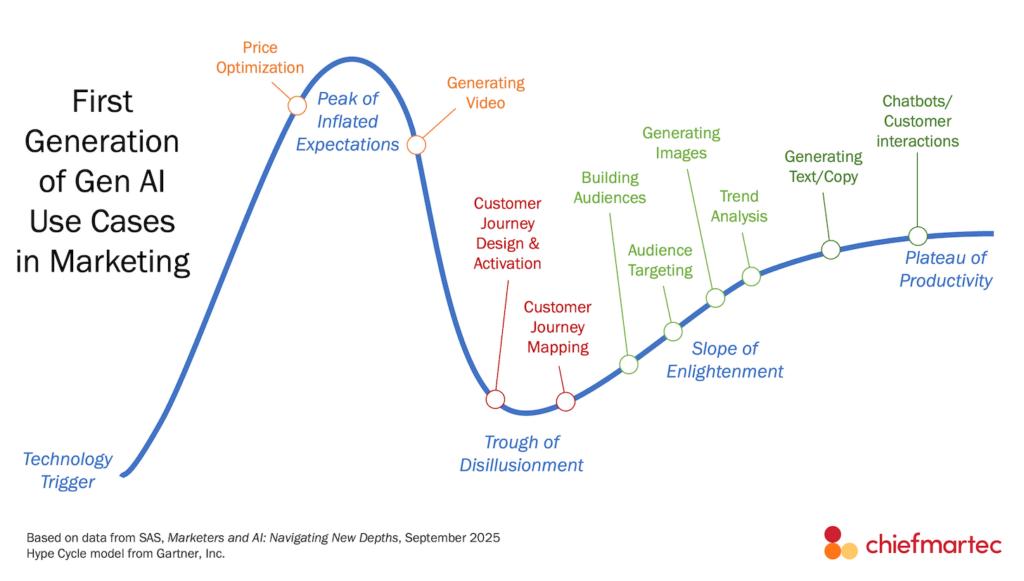
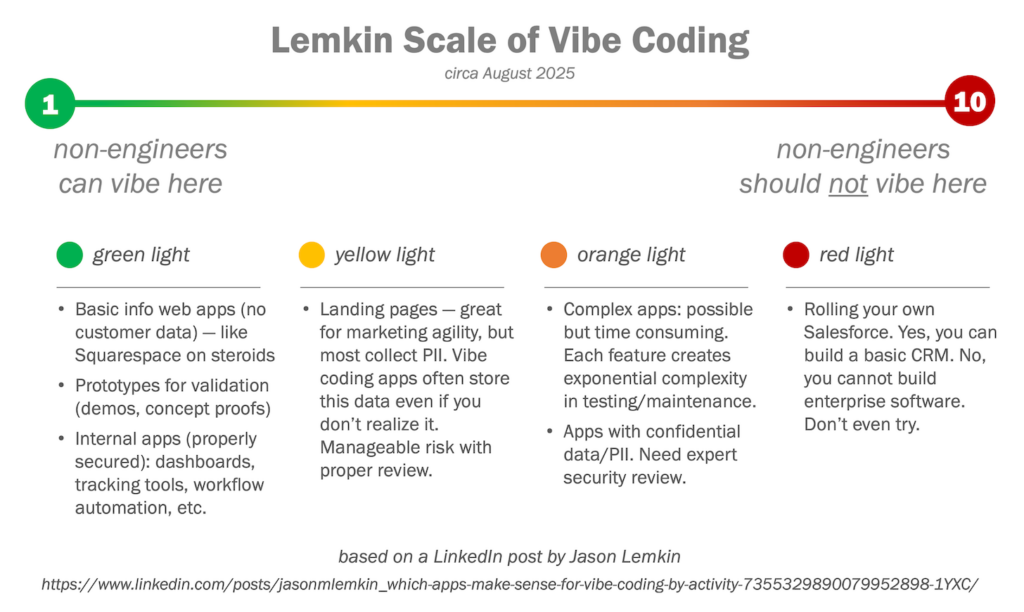
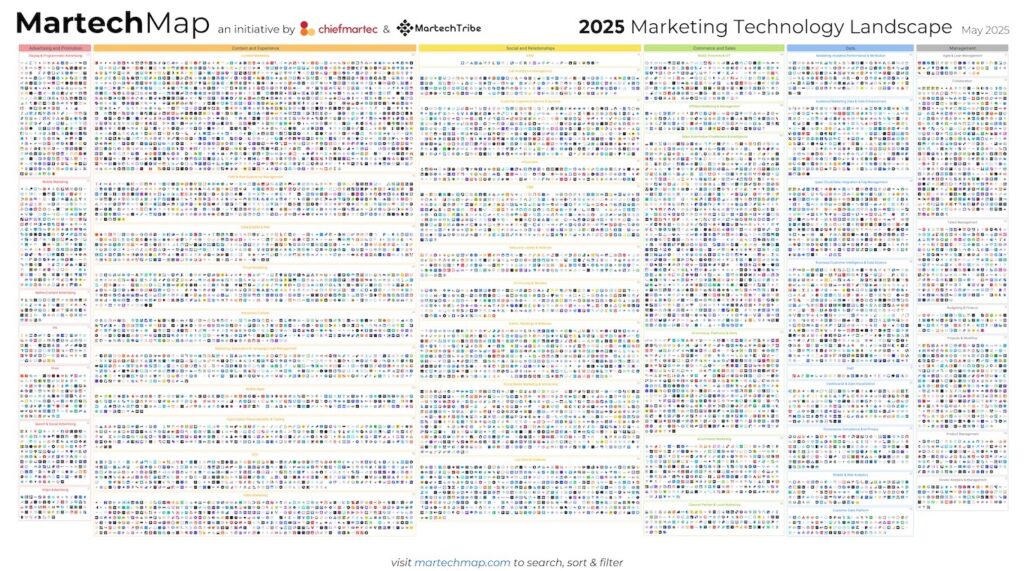
Great thought leadership as always Scott.
Your prediction #5 (More marketing technology categories will have open source alternatives) blew my mind, but I can definitely see the growth of these potential open source MarTech solutions being driven by agencies as a way shift subscription costs to service costs. Brilliant!
A question on your comment: “Some will emerge from struggling commercial vendors who fail to win #1 or #2 spots in their category, who will pivot to open sourcing their solutions as a “nuclear option.”” <– Do you have any solutions in mind? And from which section in your Landscape? The first one that came to mind for me is someone like Act-On (I don't know that they're "struggling," but they seem to have a solid platform that is often overlooked).
You could just keep predicting the $1bn marketing acquisition by Microsoft. Eventually they will need to make such purchase in order to accelerate the Dynamics Marketing and Dynamics CRM integration.
I am sticking with a prediction that eventually MS will buy Salesforce.
So, as the first Product Marketing Manager for Microsoft Dynamics Marketing, I am no longer at Microsoft as investing or growing share for this product wasn’t a priority with the Dynamics organization. Virtually one single PMM still there on MDM, not a likely indicator that its a priority. SFDC acquisition more likely, but only if they lower the premium which Benioff seems disinclined to do. Probable end state: status quo.
Pretty good predictions. 4, 5 and 7 are the best ones. I never thought about the 5 (open source alternatives) but not only makes sense as it can be game changing.
Great predictions, Scott. I especially like #5, the one about open source alternatives. I included it in this blog post curating top predictions about martech:
https://www.visioncritical.com/16-martech-predictions/